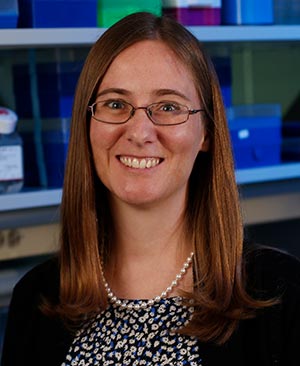Diffuse Intrinsic Pontine Glioma (DIPG) is a pediatric cancer that originates in the brainstem of children. Modern genomic profiling of the tumor has led to their updated designation as diffuse midline gliomas with histone H3K27M mutation. Although rare (1.8/100,000 population), gliomas are the most common malignant brain tumor in children, and account for the greatest cause of cancer-deaths in individuals under 19 years of age.
A child diagnosed today with DIPG faces the same prognosis as a child diagnosed 40 years ago. The lack of progress on DIPG is due to a lack of tumor tissue available for study and a lack of research funding.
TGen’s approach is focused on conducting genomic profiling of tumors which will increase our understanding of DIPG and developing techniques to monitor how tumors are responding to treatment. Our research objectives include growing DIPG cell lines to test promising, new therapies.
Currently, we are enrolling participants in two studies:
- Tissue Donation Study: “DIPG Atlas (n+1)”
- ctDNA Study: “See The Change”
Study Title: Collection of Biospecimens from Patients with Diffuse Intrinsic Pontine Glioma (DIPG)/Diffuse Midline Glioma (DMG) - "DIPG Atlas (n+1)"
Study Description: TGen is developing a bank of biospecimens (tumor and normal tissue) from patients that have passed away from DIPG/DMG on which molecular analytical research can be performed. This research may tell researchers how genes influenced the cancer and may contribute to the understanding of the genetic makeup of DIPG/DMG. This deeper understanding may lead to the discovery of new drug targets and better resources with which to guide the development of precision medicine for DIPG/DMG.
Study Status: Enrolling
Study Contact: Clinical Research Coordinator, [email protected] or 602-343-8653
More Information:
Frequently Asked Questions (FAQs) - Tissue Donation Study
Tissue Donation for DIPG/DMG Research: An Act of Courage and Defiance
DIPG/DMG tumor tissue is a gift from your family to our TGen family to give hope and answers to future families facing this diagnosis. With this gift, our scientists can conduct multiple studies to increase understanding of DIPG/DMG.
Your child’s legacy will help future DIPG/DMG patients. They will not be forgotten.
Frequently Asked Questions (FAQs)
What is the purpose of this tissue donation?
Deep genomic analysis of the patient’s tumor compared against their normal tissue will be performed. As additional cases are studied, a better understanding of the molecular subtypes of DIPG/DMG will emerge and inform strategies for tailoring treatment to best match interventions with an individual patient’s disease.
How do we donate tissue to TGen?
Once you complete the specimen release form, TGen will reach out to the facility that is storing your child’s tissue samples. We will coordinate the shipment of samples to TGen and there will be no cost to you or the facility/organization that collected the tissue.
When can we donate tissue to TGen?
TGen can conduct genomic analysis on tumor tissue that is collected by biopsy or that is donated after the participant’s passing. Families can request that tissue be shared with TGen at any time before or after the participant passes away. TGen will not request the tissue samples until after the participant has passed away.
How are the expenses of the research covered?
Generous donors support the ongoing work to “Move the Needle” against DIPG/DMG. In many instances, the availability of tumor tissue specimens establishes unique opportunities for peer-reviewed grant awards that also support the research. TGen will cover all shipping and handling costs of your loved one’s tissue donation. Participating in this study will not include any additional costs for you.
Will I be able to find out the results from any research on the tissue?
Circumstances permitting, we may be able to return research results to families of participants.
How do I enroll?
You are being asked to read this information sheet because you have been diagnosed, or have a child or loved one who was diagnosed, with a cancer, such as Diffuse Intrinsic Pontine Glioma (DIPG) or Diffuse Midline Glioma (DMG). We are requesting permission to obtain and perform experimental sequencing on your/your child’s or loved one’s tumor tissue or other samples. Sequencing may tell researchers how genes influenced the cancer and may contribute to understanding the genetic makeup of cancers like DIPG/DMG. We will also collect medical and demographic information about you/your loved one.
The samples will be stored at TGen indefinitely. The researchers may later decide that they want to perform additional tests on these samples. Future research on the samples may be performed by TGen or by researchers outside of TGen. It is possible that you or your family will not be notified of future research. The researchers may decide to share de-identified data gathered from the samples to help further research. One way that we do this is by putting information into scientific databases, where it is stored along with information from other studies. Researchers can then request to study the combined information to learn even more about cancer and diseases. Different databases may have different ways of reviewing such requests. Researchers with approval may be able to see and use your/your loved one’s de-identified information, along with information from many other people.
There is a slight risk of a loss of privacy and confidentiality associated with genomic research. We will take many precautions to protect your family’s privacy. All samples and data will be coded with a unique study ID number. Personally identifying information (such as name) will be stored separately in a secure location with limited study personnel access.
There will be no cost to donate the sample(s) and you and your family will not be paid for donating the sample(s). There is no direct benefit if you agree to participate. Your alternative is to not participate. However, families in the future may benefit from the information obtained from this research.
For questions, concerns, or complaints about the study, or about a research-related problem, please contact the study coordinator at 602-343-8653. This research is being overseen by an Institutional Review Board (IRB). An IRB is a group of people who perform independent review of research studies. You may talk to them at (800) 562-4789, [email protected] if you have questions about research subjects’ rights, concerns, or complaints that are not being answered by the research team.
The study staff may share the records generated from this research with the sponsor, regulatory agencies such as the US Food and Drug Administration, Health and Human Services, and the IRB. This information is shared so the research can be conducted and properly monitored. The people receiving this information may not be required to protect it and your/your child’s information may be re-disclosed without your permission. If you do not provide permission to use your/your child’s information, they cannot be in the study.
Your decision to participate or include your child / loved one in this study is voluntary. You will not be penalized or lose benefits if you decide not to participate or if you decide to stop participating. If you decide you would like us to stop doing research on the sample, please contact a study coordinator at 602-343-8653.
To enroll in this study by electronic consent, please select one of the following options below
(Note, clicking on the buttons above will take you to the Docusign website where you must authenticate the signature process).
Study Title: DIPG Tumor Burden/Evolution Biomarker Feasibility Study - "See The Change"
Study Description: TGen is studying the use of biomarkers in blood as an indicator of treatment success in individuals with DIPG. If successful, physicians in the future would have a non-invasive method for monitoring treatment response and metastasis in children with DIPG. Finding an easier and more reliable way to monitor tumor response is a critical need in the fight against DIPG. Additionally, this study will assess the feasibility to detect patient-specific and/or disease-specific mutations in the blood from patients with DIPG.
Study Status: Enrolling
Study Contact: Clinical Research Coordinator, [email protected] or 602-343-8653
For more information and to discuss enrollment in this study, please contact the Clinical Research Coordinator.
Contact Information:
- 445 N. Fifth St. Phoenix, AZ 85004
- [email protected]
- 1.602.343.8653

